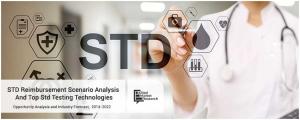STDs, particularly gonorrhea, syphilis, and congenital syphilis — babies born with the infection from their mother — are all on the rise, according to a recent report from the Centers for Disease Control and Prevention.
Across the country, reported cases of gonorrhea increased by 10 percent in 2020, while reported syphilis cases jumped 7 percent. Early data from 2021 indicated syphilis continued to rise, with cases in women surging 34 percent, the CDC said.
The pandemic has slowed data collection, but the CDC said data into 2021 indicate “the unrelenting momentum of [sexually transmitted diseases] continued even as STD prevention services were disrupted.”
In Massachusetts, the latest data is from 2020 and shows cases of gonorrhea in women jumped 20 percent from 2019 through 2020, to 2,544. The data show that 11 percent of people diagnosed with a sexually transmitted infection had more than one such infection in 2020. The health department said the figures should be interpreted cautiously because of how the pandemic impacted data collection.
At Boston Medical Center, Dr. Cassandra Pierre is seeing “the most notable increase in sexually transmitted infections across all age groups, including new HIV diagnoses in persons over 50 years old, and across all sexual preferences.”
And at Baystate Medical Center in Springfield, Dr. Durane Walker, who specializes in infectious diseases, said the numbers are going to keep rising “unless we do something drastic to curb cases.”
In Massachusetts, state data show newborns with syphilis were rare before 2019, with fewer than a handful reported each year. That jumped to 9 reported in 2019, and 10 in 2020, as the rate of syphilis among women of childbearing years also rose. Additionally, the data show sharply climbing rates of chlamydia in men and women just before the pandemic, then a steep drop into early 2020, with more recent data on all STDs not yet available.
But state health officials worry the drop is because fewer people are being tested for these infections, and does not reflect an actual decline. The health department issued an advisory to health care providers earlier this year recommending they reach out to patients to ensure they are being screened.
STDs are infections that pass from one person to another through vaginal, oral, and anal sex. They also can spread through intimate physical contact like heavy petting, though this is not very common. (Monkeypox is not classified as a sexually transmitted disease, though the CDC said last week that in 99 percent of the cases for which it has complete data, the infection was spread through men having sex with men.)
Left untreated, some infections can lead to significant health consequences. For instance, lingering chlamydia infection in women can lead to infertility, as can untreated gonorrhea.
Syphilis, which often has few early symptoms, can pose serious health problems months or years later.
“Syphilis can cause blindness, hearing loss, and deafness,” Walker said. “It may seem like a simple sexually transmitted infection but if untreated it can cause long-term effects that can last for years.”
Some health care providers said they have simply been too overwhelmed with COVID-19 cases, and a backlog of deferred care for other patients, to keep up with testing and prevention initiatives for sexually transmitted diseases.
“As many STDs can remain asymptomatic for months to years, the absence of this routine screening among people for whom it’s indicated can lead to multiple, inadvertent transmissions before an [infection] is caught and treated,” said Pierre, Boston Medical Center’s associate hospital epidemiologist and medical director of public health programs.
The CDC recommends at least yearly screening for all sexually active women under age 25 for two of the most common STD’s, gonorrhea and chlamydia, and for women older than 25 who have a new or multiple sex partners. It also says everyone who is pregnant should be tested for syphilis and HIV, as well as other STDs. And all sexually active gay, bisexual, and other men who have sex with men should be tested at least once a year for syphilis, chlamydia, gonorrhea, and HIV.
Other contributing factors to the rising number of sexually transmitted diseases, doctors said, include an epidemic of opioid addiction that has impaired users’ judgment about risks, as well as the declining use of condoms as more people take medications, known as PrEP (pre-exposure prophylaxis) that can significantly reduce risk of HIV infection from sex or IV drug use.
But PrEP medications do not protect against other sexually transmitted diseases, so doctors say patients should take precautions and be screened regularly for STDs.
“Testing is so important because these [infections] are all curable. And in some cases, it’s with just a single dose of antibiotics or an injection,” said Dr. Kevin Ard, director of the sexual health clinic at Massachusetts General Hospital.
Amid the rise in infections, doctors are pushing back.
Ard’s clinic is offering testing and treatment at community health centers and other community events because, he said, some people “are reluctant to come into our clinic in a big hospital.”
His clinic, and more than a dozen others in Massachusetts, receive funding from the state so they can offer free STD testing to those without health insurance.
Wessolossky, at UMass Memorial Health, has opened an STD clinic at the AIDS Project, a social service provider in Worcester that specializes in outreach to homeless people and those with drug addictions.
Pierre, at Boston Medical Center, is offering patients who come in for monkeypox treatment a bundle of tests for several sexually transmitted diseases if they report two or more recent sexual partners.
“We have unfortunately, but predictably, diagnosed and treated [STDs] among a number of individuals who presented for monkeypox vaccination,” Pierre said.
And Walker, from Baystate Health, is offering self-swabbing kits, similar to the at-home COVID tests, so patients can swab their genitals, throats, and other areas in the privacy of their own home, then bring the swabs to the clinic, or a Baystate Health lab near them to have the specimens checked for gonorrhea and chlamydia.
Dr. Durane Walker offers no-questions-asked self-testing kits. Patients take kits home, with directions on how to swab themselves, then bring them back for processing.
Suzanne Kreiter/Globe Staff
“When they come to drop the specimens off, we encourage them to also get a blood test for syphilis or HIV as necessary,” Walker said. “People feel more engaged and less judged.”
State and national data show significant, persistent disparities in sexually transmitted diseases. For instance, the recent CDC report showed that in 2020, 32 percent of all cases of chlamydia, gonorrhea, and syphilis were among non-Hispanic Black people, even though they made up only approximately 12 percent of the US population.
“It is important to note that these disparities are unlikely explained by differences in sexual behavior and rather reflect differential access to quality sexual health care,” the report said.
As the number of infections increases, so too, does the number of less common yet more serious complications. Particularly troubling, Ard said, is the growing number of pregnant women with syphilis he is encountering at his clinic in Mass. General. With each one they catch, he worries there may be others who don’t get regularly screened and are missed.
Untreated syphilis in pregnant women can lead to babies with severe health problems, including cataracts, deafness, seizures, and death.
“It’s really sad because it was so rare for a while,” Ard said. “And it’s completely preventable.”
Kay Lazar can be reached at [email protected] Follow her on Twitter @GlobeKayLazar.
Discovered on: 2022-07-26 23:17:24
Source: Sexually transmitted diseases rise rapidly as precautions wane


